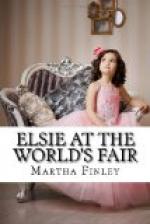“Let us go to the Transportation Building,” proposed Rosie as they landed again. “I want to see that golden doorway, and have not the least objection to passing through it and examining things inside.”
“As no one else has, I presume,” said her grandfather. “No doubt we shall find a great deal there worthy of examination.”
“Yes, sir; much more than we can attend to in one visit,” replied Harold, leading the way, as everyone seemed well pleased to carry out Rosie’s suggestion.
They had heard and read of the beautiful golden doorway and viewed it with interest and satisfaction.
“It is very, very beautiful,” said Grandma Elsie, “a nest of arches covered with silver and gold.”
“And that border is lovely, lovely!” exclaimed Rosie; “such delicate tracery!”
“Papa, is it solid gold?” asked little Elsie, who was clinging to her father’s hand on one side, while Ned had fast hold of the other.
“No, daughter,” the captain replied, “not solid, though there is a good deal of both gold and silver covering the other and cheaper materials.” Then he called her attention to a relief on the left side of the arch, showing an ox-cart with its clumsy wheels dragging slowly along through heavy sand, the travellers in it looking most uncomfortable.
“That, children,” he said, “is the way people used to travel years ago when I was a little fellow, such as you are now, Neddie boy; and this”—going to the other side of the arch and pointing to the contrasting relief—“shows how we travel now. See, it is a section of a palace-car; some of the people reading, others gazing from its plate-glass windows, and a porter serving them with luncheon.”
“Yes, papa; that’s the way we travel when we don’t go in the Dolphin or in our carriage, and it’s a great deal nicer than that ox-cart,” said Elsie.
“Oh, papa, there are some words up there!” exclaimed Ned, pointing up to a higher part of the arch. “Please read them.”
“I will, son,” replied the captain, “though I think you are hardly old enough to fully understand them. This”—pointing it out—“was written by Macaulay, of whom you will learn more when you are older: ’Of all inventions, the alphabet and the printing-press alone excepted, those inventions which abridge distance have done the most for civilization.’ This other is by Lord Bacon: ’There are three things which make a nation great and prosperous: a fertile soil, busy workshops, and easy conveyance for men and goods from place to place.’ Those words are put upon this building because in it are shown the different modes of travel in different countries—on the sea also—at different times.”
They stood for some little time longer examining into the details of that wondrously beautiful doorway, noticing the splendor of the arches and pylon, the stairway on each side, the roof of the pavilion and all the other beauties.




